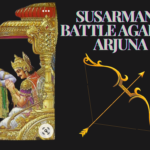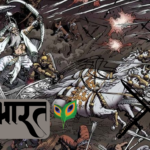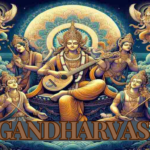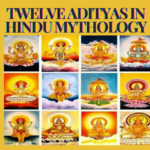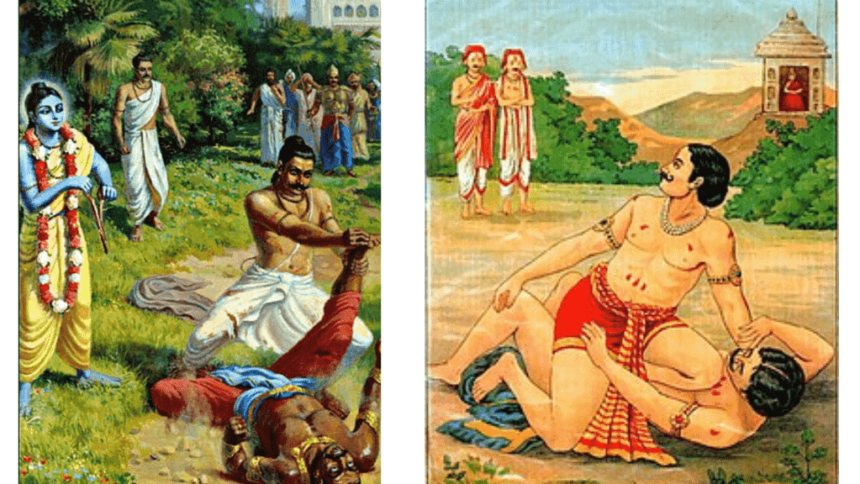In the grand tale of the Mahabharata, one of the most enduring characters is Jarasandha, king of Magadha. A formidable rival of the Pandava brothers, Jarasandha’s legend is steeped in mystery, power, and intense symbolism. His origins, rule, and eventual fall are central to understanding his role in this epic saga.
Jarasandha’s Genealogy
Jarasandha was born into the royal lineage of King Brihadratha, one of Magadha’s most illustrious kings. Despite his royal stature, Brihadratha suffered a personal tragedy; his inability to produce an heir with his two queens, the twin princesses of Kashi, cast a shadow over his reign. Determined to overcome this, he left his kingdom and retreated to the forest, where he sought guidance from the sage Chandakaushik. His rigorous penance under the sage’s tutelage resulted in a miraculous birth, which laid the foundation for Jarasandha’s life.
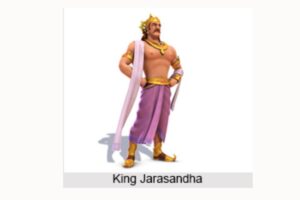
The Birth of Jarasandha
King Brihadratha’s ascetic devotion was rewarded when Chandakaushika gave him a fruit, and instructed him to divide it between his two queens. Each queen ate half of the fruit, and soon, they both became pregnant. However, this happiness was short-lived as each queen gave birth to a half-human child. Distraught by this peculiar occurrence, the king ordered both the halves to be thrown into the forest.
As fate had it, a demoness named Jara saw the two halves. Driven by her innate curiosity and compassion, she joined them, and they miraculously transformed into a healthy baby boy. Jara, naming the child Jarasandha after himself, returned him to King Brihadratha, who was overjoyed to finally have an heir.
Jarasandha’s Rise to Power
Jarasandha became a powerful and ambitious ruler. He had the greatest multitude of any ruler. He had detained 86 rulers in his jail and every one of their lords riches and armed force were in his control. Chedi’s Above all else Shishupal was feeling regarded to act as Jarasandh’s military commandant. force of Jarasandha was in his strong partners like Kalyavana, Naraksura, Hansha, Dimbaka.His reign over Magadha was marked by military conquests and an indomitable desire to expand his kingdom. He forged alliances through marriage, which strengthened his position as a formidable power in the region. However, his aggressive expansionism and subjugation of neighboring kingdoms also earned him many enemies, including the Pandavas.
Jarasandha and the Pandavas
Jarasandha’s enmity with the Pandavas is an important element in the Mahabharata. His refusal to accept Krishna as a divine being and his relentless persecution of Krishna’s clan, the Yadavas, established him as a major antagonist. The Pandavas, under Krishna’s guidance, recognized that Jarasandha’s elimination was crucial to the establishment of peace and dharma.
Why does Jarasandha hate Krishna?
Krishna says that Jarasandh hates Krishna as he killed Kansa, and made 2 of his daughters widows. He doesn’t want Mathura to suffer for his deeds. Krishna says that war should be held when all other alternatives have been exhausted.
War and fall of Jarasandha
The confrontation between Jarasandha and the Pandavas culminated in a dramatic confrontation. The other Pandava, Bhima, known for his immense strength, challenged Jarasandha to a wrestling match. Disguised as Brahmins, they approached Jarasandha and asked him to choose one of them in a duel. He chose Bheema. Refusing to release the kings, he accepted this challenge and was killed by Bhima.
Jarasandha and Bhima battled for 27 days before Krishna suggested that Bhim break his opponent in half.
The duel was fierce and lasted for several days, with neither side showing signs of weakness. Finally, on Krishna’s advice, Bhima split Jarasandha’s body into two parts, causing the two halves to face in opposite directions, never to be reunited. This strategic move led to the end of Jarasandha, a significant victory for the Pandavas.
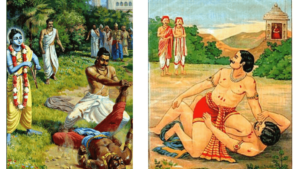
Jarasandha’s Legacy
Jarasandha’s story is not just about a king and his wars; it reflects timeless themes of fate, perseverance, and the struggle between good and evil. His life filled with triumphs and tribulations is a powerful reminder of the fleeting nature of power and the ultimate triumph of dharma.

